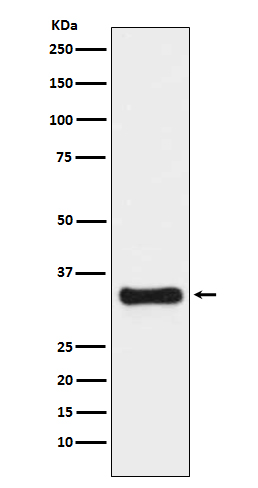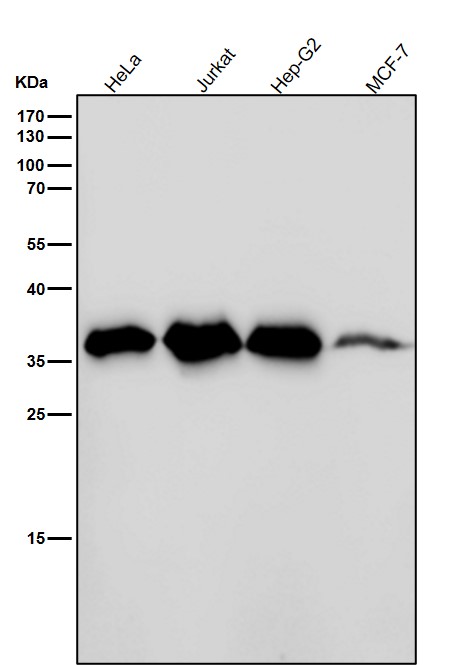


| WB | 咨询技术 | Human,Mouse,Rat |
| IF | 1/20-1/50 | Human,Mouse,Rat |
| IHC | IHC:1/100-1/200;IHF:1/50-1/200 | Human,Mouse,Rat |
| ICC | 1/50-1/200 | Human,Mouse,Rat |
| FCM | 1/20-1/100 | Human,Mouse,Rat |
| Elisa | 咨询技术 | Human,Mouse,Rat |
| Aliases | d TMP synthase; HsT422; Thymidylate synthase; TMS; TS; TSase; Tyms; TYMS protein; Tyms thymidylate synthetase;;Thymidylate synthase |
| WB Predicted band size | 36 kDa |
| Host/Isotype | Rabbit IgG |
| Antibody Type | Primary antibody |
| Storage | Store at 4°C short term. Aliquot and store at -20°C long term. Avoid freeze/thaw cycles. |
| Species Reactivity | Human,Mouse,Rat |
| Immunogen | A synthesized peptide derived from human Thymidylate synthase |
| Formulation | Purified antibody in PBS with 0.05% sodium azide,0.05% BSA and 50% glycerol. |
+ +
以下是关于Thymidylate Synthase(TS)抗体的3篇参考文献,涵盖抗体性能比较、临床预后关联及方法学开发:
---
1. **文献名称**:*"Comparative analysis of thymidylate synthase monoclonal antibodies in colorectal cancer immunohistochemistry"*
**作者**:J. H. Shia et al.
**摘要**:该研究比较了两种TS单克隆抗体(TS106和TS106-6H3)在结直肠癌组织中的免疫组化表现,发现TS106-6H3在福尔马林固定组织中染色特异性更优,且高TS表达与5-FU化疗耐药性显著相关。
---
2. **文献名称**:*"Thymidylate synthase expression as a predictor of clinical outcome in gastric cancer"*
**作者**:T. Ishida et al.
**摘要**:通过免疫组化检测胃癌患者TS蛋白水平,发现高表达患者接受5-FU辅助化疗后总生存期更短,提示TS可作为化疗反应不良的预后标志物。
---
3. **文献名称**:*"Production and characterization of a monoclonal antibody against human thymidylate synthase"*
**作者**:M. Kamoshida et al.
**摘要**:研究团队利用重组人TS蛋白制备了高特异性单克隆抗体(克隆号TS106),验证其在Western blot及免疫组化中的应用,证实其适用于福尔马林固定组织的TS蛋白定量分析。
---
**注**:以上文献发表于2000年代初期至中期,聚焦TS抗体的开发验证及临床转化,反映了TS在癌症治疗中的关键作用。如需具体期刊信息或更多文献,建议通过PubMed或Web of Science进一步检索。
Thymidylate synthase (TS) is a key enzyme in DNA synthesis, catalyzing the conversion of deoxyuridine monophosphate (dUMP) to deoxythymidine monophosphate (dTMP), which is essential for cellular replication and repair. Due to its critical role in nucleotide metabolism, TS is a primary target for chemotherapeutic agents like 5-fluorouracil (5-FU), which inhibit its activity to disrupt cancer cell proliferation.
TS antibodies are immunodetection tools developed to study TS expression and localization in tissues or cell lines. These antibodies enable researchers to quantify TS levels via techniques such as immunohistochemistry (IHC), Western blotting, or ELISA. Clinically, TS overexpression is linked to resistance to 5-FU-based therapies in cancers like colorectal, gastric, and breast cancer. Thus, TS antibodies are used to assess tumor TS levels, guiding personalized treatment decisions and predicting therapeutic response.
In research, TS antibodies help unravel the enzyme’s regulatory mechanisms, including post-translational modifications and interactions with other proteins. They also aid in exploring TS's role beyond cancer, such as in inflammatory diseases or microbial infections.
Commercially available TS antibodies are typically raised against specific epitopes of human TS protein, validated for specificity and sensitivity. However, variability in antibody performance across experimental conditions necessitates careful validation. Ongoing efforts focus on improving antibody reliability and developing novel applications, such as companion diagnostics for targeted therapies. Overall, TS antibodies remain vital for both basic research and clinical oncology.
×